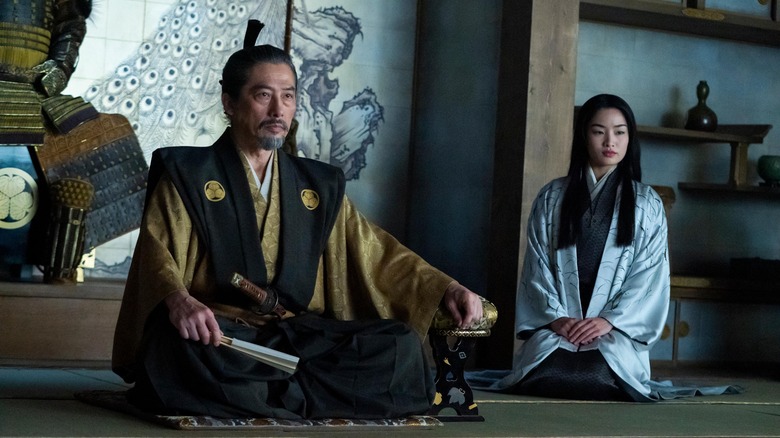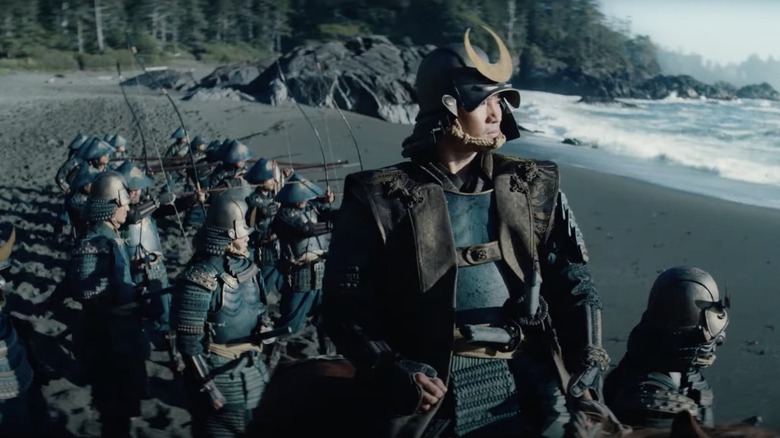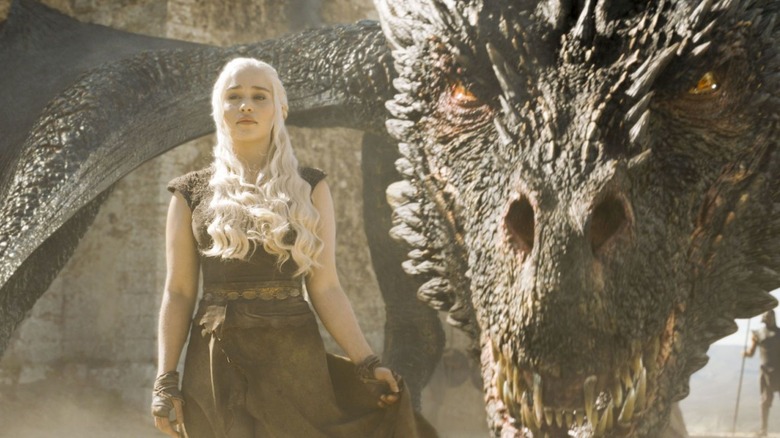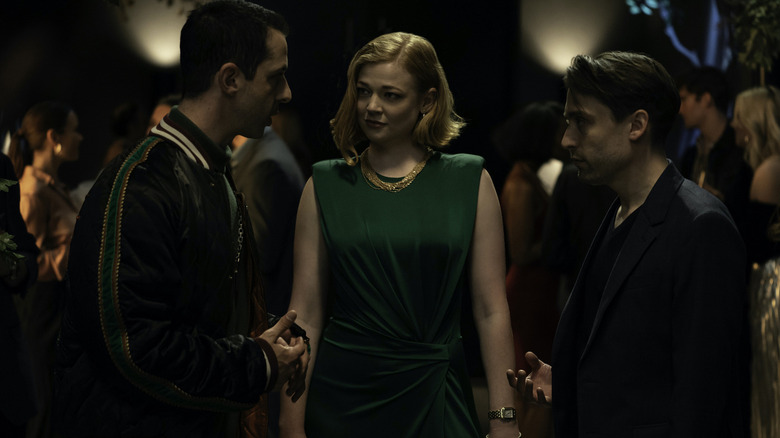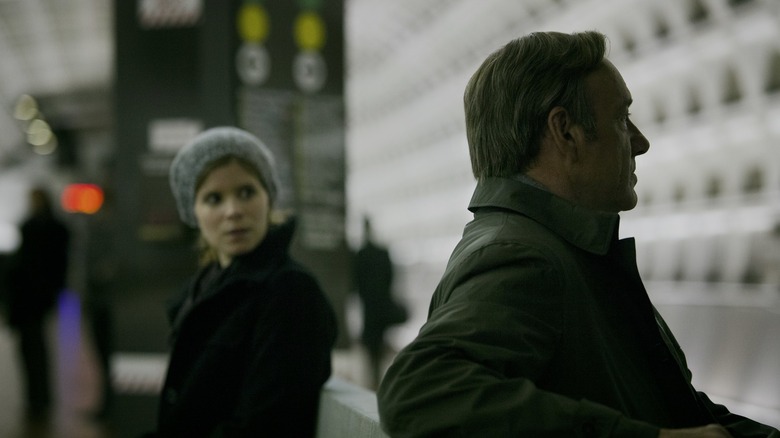Why Shogun Director Jonathan Van Tulleken Thinks Game Of Thrones Isn't The Show's Best Comparison
It's been five years since "Game of Thrones" ended, but TV studios are still trying their best to recreate the show's success. HBO now has the spin-off "House of the Dragon" going for them, Prime Video has "The Rings of Power," and now FX seems to have "Shōgun." Sure, the show isn't actually a fantasy series, but it's also in a medievalesque setting and focuses on a bunch of schemers doing morally questionable things. For "Shōgun" director Jonathan van Tulleken, however, "Game of Thrones" isn't the show that comes to mind when describing his series. Instead, he seems to view it as a spiritual successor to two other TV shows with far more contemporary settings. As he explained in a recent interview:
"Truly it is a character piece and it is about this intrigue ... This is a dangerous world where violence can come out of nowhere but the real danger is in the machinations. A conversation can be as dangerous as anything else. A better comparison [than 'Game of Thrones'] would be 'Succession' or 'House of Cards.'"
At first glance, the quote really seems to be selling the HBO drama short. As any fan of "Game of Thrones" can tell you, the majority of that show was indeed character-focused centered around conversations. There were moments of extreme violence, sure, but there was also no shortage of impressive dialogue with all sorts of ominous double meanings behind them. "A conversation can be as dangerous as anything else," was basically the show's thesis statement for its first four seasons, even more so than it was for "Succession" and "House of Cards." (There, at least, the stakes weren't usually as life-or-death.) So, what gives? Why the hesitance to compare "Shōgun" with HBO's massive cultural phenomenon?
Avoiding that Western gaze
It's possible that van Tulleken's reluctance to compare "GoT" with "Shōgun" might come down to a discomfort with comparing a historical drama set in Japan, based on real events and real Japanese customs, with a fantasy series featuring dragons and ice zombies. It's not inherently disrespectful — historical fiction set in a completely difficult culture than the reader/viewer's can indeed scratch a similar itch to fantasy/sci-fi fiction — but the comparison often comes with the implication of exoticization, or just a general inability to see other cultures as being as real as one's own.
If you scroll through fiction review platforms like Goodreads or Letterboxd, for instance, it's not that uncommon to see sci-fi/fantasy-esque criticisms towards regular real-world stories set in other countries. "Poor worldbuilding," complained one infamously terrible user review of "100 Years of Solitude," criticizing the book's Columbia setting as if the country isn't a real place with a real culture the reader could easily look into.
It's easy to see how this attitude might be a concern to the creatives involved with "Shōgun," since both the original book and the 1980 adaptation do sort of lean into the idea of feudal Japan as something out of a fantasy novel. This new show, meanwhile, makes the adaptive choice to more strongly emphasize the Japanese character's perspectives early on, denying western viewers the chance to see this culture through a purely western lens. "[Shōgun] is made hand in hand with the Japanese because it is a story about two cultures encountering each other and seeing ourselves in each other," van Tulleken said. "We are way past [the western gaze] in terms of audience sophistication and the stories we want to tell."
Still, the case for Game of Thrones
The best argument for "Game of Thrones" as a "Shōgun" comparison is that the characters are limited to using much of the same technology, and that both series are committed to the idea that anyone can die at any moment. The pilot for "Game of Thrones" started off by introducing three characters of the Night's Watch — two of them died immediately, and one of them survived long enough to die a few scenes later. Likewise, "Shōgun" had one of Blackthorne's crew members casually boiled alive in the first episode, featured a seemingly-random decapitation, as well as the off-screen murder of a baby. Life is cheap in this world, both pilots made clear.
The obvious difference between the two is that "Shōgun" has no magical elements, but when it comes to magic's placement in the narrative, Blackthorne's guns (and his knowledge of more advanced European battle tactics) serve the same function as Daenerys' dragons. They're a massive strategic advantage that promise to completely change the landscape of Samurai warfare. Just as Daenerys' claim to her dragons gave her most of her power, Blackthorne's warfare skills have unwittingly made him the most important person in Japan.
Of course, this time we won't have to wait seven seasons for Blackthorne's dragons to make an impact on the other storylines. Whereas "Game of Thrones" had thousands of pages of source material to work with, the "Shōgun" creators have confirmed that (as of now, at least) they've only planned to adapt the first book of James Clavell's "Asian Saga" series. Blackthorne's going to have a major impact on feudal Japan, and he's going to do it within the next seven episodes.
The case for Succession
A "Succession" comparison admittedly seems weak at face value. Not only is nobody ever murdered on this show, but "Succession" intentionally lacks a clear good guy character. "Shōgun" may have plenty of morally ambiguous characters, but at the end of the day it sure seems like the viewer is generally supposed to like them. Blackthorne, Toranaga, and (especially) Mariko are all given no shortage of humanizing moments to keep the audience on their side. "Succession" offers viewers no such luxury; there's certainly room for you to root for your favorite Roy in the cast, sure, but the show never lets you forget that even your fave is a terrible person.
Where the "Succession" comparison makes the most sense is with the show's use of language. It's a show where everyone's hedging their words and nearly every conversation is carefully calculated. If you're not paying full attention to the specific words being used and the specific tone they're being delivered in, major character beats and plot points might fly right over your head. The show trusts you to understand that even words like "uh-huh" have a dozen potential meanings depending on the context, and leaves it to you to figure them out.
Likewise, "Shōgun" is a wordsmith's dream come true. So many of its scenes involve an English Blackthorne lying to a Japanese Toranaga, with a multi-cultural Mariko making constant split-second choices as to which parts of his speech to translate and which to gloss over. She doesn't lie, exactly, but her personality is constantly revealed even as she's supposed to be impartial. On both "Shōgun" and "Succession," every little word feels crucial.
The case for House of Cards
"House of Cards" feels like the odd one out among van Tulleken's examples, as it never reached the massive success of "Game of Thrones" nor was it ever as respected as "Succession." It starts to make sense, however, once you remember that both shows heavily focus on one man's schemes to gain control over an entire real-world country. Frank Underwood and Lord Toranaga are schemers, both of whom claim to not want to be President/Shōgun but whose actions certainly seem to indicate otherwise. Both use unprecedented sneaky and inventive tactics; even when their actions are morally dubious at best, we still root for them because it's fun to watch a competent schemer do his thing.
What makes "Shōgun" especially interesting is that it basically has two Frank Underwoods. Toragana's scheming his way up to the top of the food chain, and Blackthorne's doing the same thing in his own English manner. Toranaga may have broken political precedent by resigning his seat in the Council of Regents and forcing the council members to find a fifth member before they could retaliate, and Blackthorne had his own stroke of genius by intuiting Toranaga's distrust of the Portuguese priests and using it to his own advantage. So far, "Shōgun" has given us the story of two untrustworthy ladder-climbers who manage an uneasy-yet-beneficial alliance. As the season goes on, it'll be fun to see just how far this partnership takes them. Will they stick by each other's side, or is someone getting thrown under another train?
